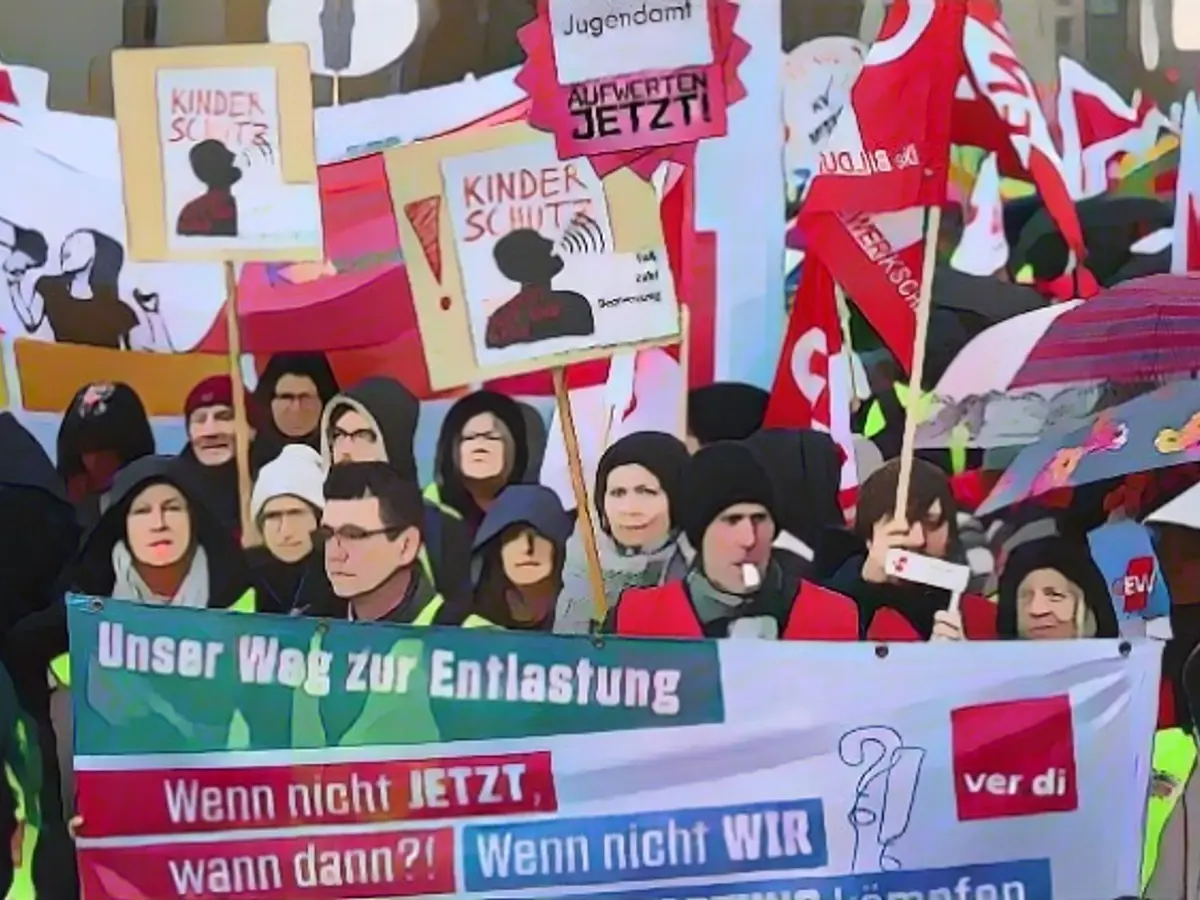Social workers and educators take action for pay equality
In an ongoing fight for fair wages, state employees in the social and educational sectors are taking a stand. With concerns about staff shortages, overwork, and unstable working conditions, these dedicated professionals are participating in strikes across various cities. The recent waves of action have primarily affected Hamburg, Bremen, and Berlin.
Pressure from Within
Verdi, the union representing employees in the federal states (excluding Hesse), has been applying pressure to employers during wage negotiations for state employees, not including those from Hesse. The latest strategy involves warning strikes in the social and educational sectors. The impact was particularly poignant in Berlin, where state-owned daycare centers were among those joining the strike. Around 3,000 employees took part in a demonstration outside the House of Representatives, according to Verdi[1].
The Impact in Berlin
It was unclear how many Berlin daycare centers were affected by the strikes. However, Verdi reported that state-owned companies with approximately 7,600 educational staff account for around 20% of the capital's daycare places[1]. Additionally, strikes occurred at daycare centers run by the Workers' Welfare Association that was also negotiating a company collective agreement. Employees within youth welfare offices, social services, and schools, including social workers, also participated in the strike[1].
Echoing Across Regions
Warning strikes were not limited to Berlin. The union also reported that approximately 1,400 employees in Bremen had demonstrated in support of the cause[1]. Strikers from various offices and authorities also planned to gather in Hamburg to show their solidarity for the social and educational services[1]. In some cities, the impact of the strikes was broader. For example, in Hamburg, employees at district offices and the fire department joined the strike, demonstrating their support for better working conditions and pay in the social services[1].
The Demand for Fair Pay
Ongoing collective bargaining talks are centered around around 1.1 million state employees, with the exception of Hesse. The unions are pushing for a 10.5% increase and at least €500 more per month, along with inflation compensation[1]. Employers have remained quiet on offering new proposals, citing budget concerns[1]. However, unions have announced their intention to extend the warning strikes prior to planned negotiations in early December [1].
A Wide-Spread Movement
The wave of warning strikes did not stop with the social and educational sectors. Similar actions were taking place in other administrative areas, such as in Hamburg, where employees at district offices and fire departments joined the strike[1]. In Bavaria, university employees planned for warning strikes, while in Baden-Wuerttemberg, employees from the state monument preservation department also participated[1].
Sources [1]
Additional information (enrichment data)
Warning strikes have not been confined to Hamburg, Bremen, and Berlin. Various regions in Germany have also seen heightened industrial action. Here are some additional regional examples:
- Berlin: Nurses at the Charité and Vivantes hospitals, employees at Berliner Wasserbetriebe (BWB), Berliner Stadtreinigung (BSR), and some Job Centre employees joined the strikes [4].
- Leipzig, Saxony: Members of the German Education Union (GEW) working in certain youth and disability education services participated in the strikes [4].
- Hesse: Water board and theatre employees, as well as public sector workers in Main-Taunus, Hochtaunus, Wetterau, and Offenbach, joined the wave of strikes [4].
- Frankfurt and surrounding areas: Public sector workers, including those in Kitas (childcare), hospitals, and rubbish collection, participated in the strikes in various federal states, including Hesse [4].
These strikes form part of a larger movement fueled by the ongoing pay negotiations between ver.di and employers across various industries in Germany [4].








